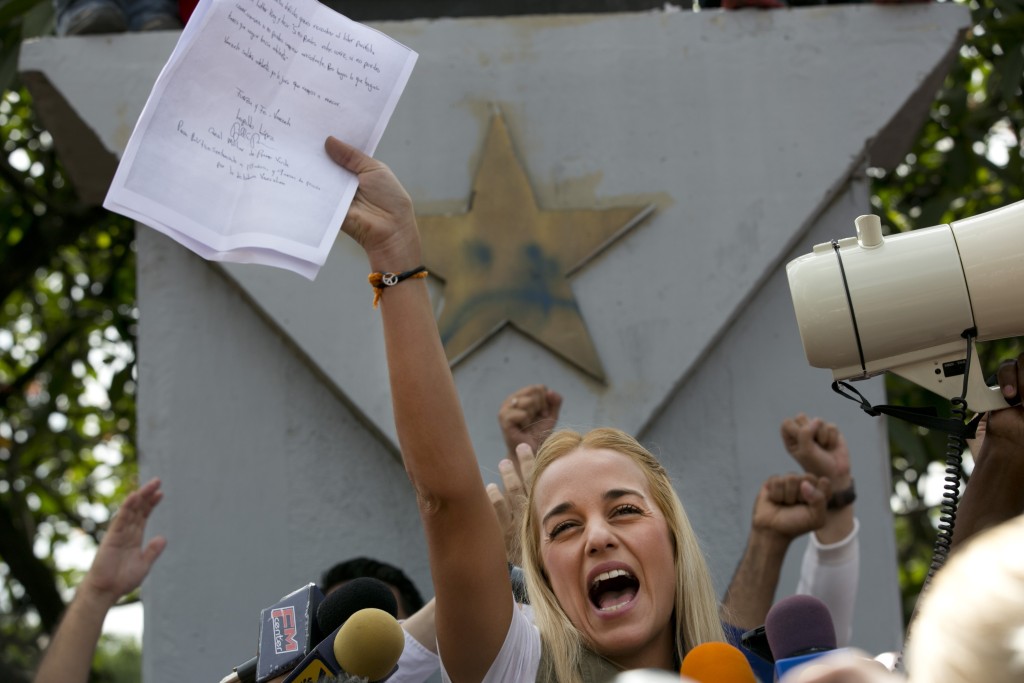Latin America split as Chile, Costa Rica, Paraguay and Peru criticize sentencing of opposition leader
Venezuela reacted angrily yesterday after Chilean lawmakers voted to approve a congressional document condemning the recent jailing of high-profile opposition leader Leopoldo López, who was sentenced last week to 13 years and nine months in prison on charges he claims are trumped up.
In a document approved unanimously by the Senate, Chilean lawmakers expressed their anger at “the sentence that condemns for 13 years and nine months Mr Leopoldo López, because the guarantees of due process have been violated.” The document also called on the Organization of American States (OAS) to intervene, calling on the body to use its authority to push for the release of López and other jailed dissidents.
López, a hardline opposition leader of the Popular Will party with a chequered reputation, was convicted five days ago of inciting protests against the government which began in 2014, along with four other activists. He was also found guilty of provoking arson, violence and damage to public property.
The trial, held behind closed doors, was widely denounced by human rights groups and opposition supporters, especially when details of the proceedings emerged. Judge Susana Barreiros rejected 58 of the 60 witnesses proposed by the defence, López’s defence team claim. The judicial official however allowed the prosecution to call 108 witnesses.
In a terse statement in response to yesterday’s vote in Valparaíso, Venezuela’s Ministry of Foreign Affairs said Chile was “issuing interventionist judgements” and demanded Michelle Bachelet’s government “maintain a respectful relationship and avoid meddling in internal affairs.” Caracas said it was “necessary to remind” Chile “that non-intervention in the internal affairs of another state is a fundamantal principle enshrined in international law.”
The trial, held behind closed doors, was widely denounced by human rights groups and opposition supporters, especially when details of the proceedings emerged.
In a petulant tone, the government then added, “any statement that violates that essence contributes nothing to the construction and improvement of bilateral relations,” before letting rip with references to dark moments in Chilean history.
The Foreign Ministry said “Venezuela has never issued or will issue opinions on these serious issues that Chile has lived,” before listing examples such as the “judicial treatment and allegations of the systematic violations of human rights against the Mapuche people” or “the impunity of perpetrators of crimes against humanity, committed during the dictatorship” of Augusto Pinochet.”
“Equally, it would be unthinkable (for Venezuela) to make judgements about the privitization of education in Chile, which violates the human rights of the majority who do not have access to education.”
The Chilean Congress dismissed Venezuela’s claims, saying its stance “refers to a respectful expression about human rights and fundamental guarantees.”
“Ever since its people defeated the dictatorship, Chile has received statements both from foreign governments and bodies about the situation of human rights in our country, and we have never seen them as meddling in internal affairs,” the Chilean Foreign Ministry stated.
Separately, the Chilean Socialist Party (PS) issued a statement, saying the jailing of López is detrimental to human rights.
LatAm criticism
With its declarations, Chile becomes the latest Latin American country to express its concern over López’s sentence, lining up alongside Costa Rica, Paraguay and Peru.
“With regard to the judgment in the case of Leopoldo López and four Venezuelan citizens,” the Peruvian Foreign Ministry said on Sunday, “the Government of Peru wishes to express its concern about the situation of internal polarization that affects its sister Bolivarian Republic of Venezuela.” Peru called for dialogue between the “various political forces” to “maintain peace and tranquility.”
Last week, Costa Rica’s Ministry of Foreign Affairs too said it had reacted “with concern” to López’s conviction. President Luis Guillermo Solís went even further, openly criticizing the judgment, saying “I think it’s a very bad idea to use the courts to punish citizens for their political views.”
The Paraguayan government led by Horacio Cartes hinted that it too didn’t feel the opposition leader had faced a fair trial. The government said that “as is well known, since the dawn of independence, Paraguay has always defended and afforded full respect of the principle of non-intervention in the internal affairs of states, but nevertheless, it has categorical on the protection of fundamental rights, such as civil and political rights.”
Asunción said it hoped López, and the students convicted alongside him, would “be able to exercise their right to defence in a trial,” should they appeal the conviction and sentence and called for “sincere dialogue among all political and social sectors.”
Continental split
Further north, the United States also declared its disapproval in the immediate aftermath of the sentencing on Thursday night, warning the ruling could hurt attempts to normalize relations between the two governments.
Much of the rest of Latin America however has failed to pass public comment, with the situation seeming to split the continent.
Uruguay — also currently the holder of the rotating presidency of the Unasur — failed to comment publicly on the ruling, but reports have emerged of a split in the ruling Broad Front (FA) coalition over the issue.” Last week, two senators — Rafael Michelini and Daniela Payssé — broke ranks to slam the ruling and brand López a “political prisoner.”
Brazil too was mostly quiet, with the most high-profile comments coming from opposition Senator Aloysio Nunes, who said the ruling threatened the legitimacy of Venezuela’s upcoming parliamentary elections.
The rest of the continent — and notably many of the region’s presidents, including Tabaré Vázquez, Juan Manuel Santos, Enrique Peña Nieto, Rafael Correa and Evo Morales — on the whole remained silent.
In Argentina and Brazil, the most prominent voice to denounce the trial was presidential candidate Mauricio Macri, the PRO leader running under the Let’s Change banner in October. Macri called on the members of the Mercosur to “intervene,” to safeguard López’ right to freedom.
@URLgoeshere
Originally published in the Buenos Aires Herald, on Wednesday, September 16, 2015.
Link: http://www.buenosairesherald.com/article/198838/venezuela-snaps-back-at-critics-of-l%C3%B3pez-ruling.

